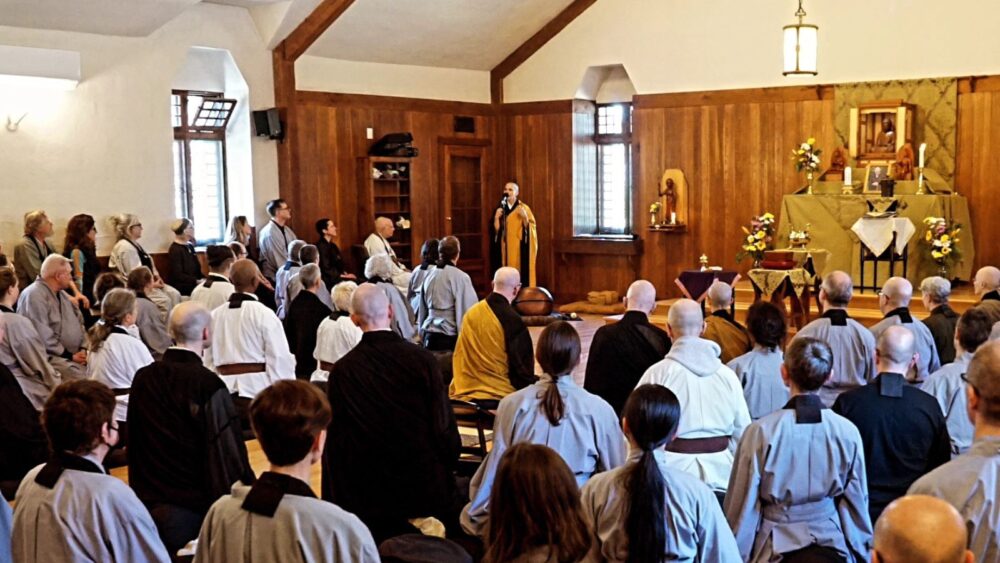
SHANDAKEN, N.Y. — On a recent Sunday morning at the Zen Mountain Monastery — nestled in the Catskill Mountains — more than a hundred worshippers gather for a service of chanting and meditation. Light floods through the windows of the lofted wooden room, illuminating the space. After two hours of chanting liturgy and sitting in Zazen meditation, the congregation stretches and shakes out their limbs before settling back down on their zabutons — cushioned mats. Some are crossed-legged, while others sit on their feet; all are turned towards the altar, prepared to receive the spiritual teaching known as the Dharma talk.
A man in a white robe — indicating his status as a senior student — walks down the aisle and approaches the altar. He performs a series of ritual bows, walks clockwise around his mat, and sits with his legs crossed. Then, a Buddhist priest walks down the aisle with a small lectern draped with a blue cloth and places it before him. The man unfolds the cloth to reveal a small notebook and reaches for a lavalier mic stowed beneath his mat. He clips the mic to his lapel, takes a deep breath, and presses his palms together, offering a gassho — a bow with hands in a prayer position — as an offering to the congregation and a sign that he’s ready to begin his teaching.
A Buddhist priest in the corner of the room taps the rim of a large singing bowl three times, and the congregation begins to chant the names of the four bodhisattvas — enlightened beings who vowed to remain in the world to guide others, embodying central virtues such as compassion and wisdom that practitioners hope to cultivate.
In Buddhism, a Dharma talk is public discourse, given by a teacher or senior student, with the intention of providing practical wisdom about the practice. It is casual, with a conversational style, and has witticisms sprinkled throughout. It seems to balance the delight and discomfort of the practice perfectly, holding space for suffering while allowing joy to float to the surface.
On most Sundays at Zen Mountain, the Dharma talk is given by Sansho — the abbot of the Monastery — but he wasn’t feeling well and asked Gikon — the man in the white robe — to fill in. Gikon opened by acknowledging his fear and anxiety, calling out his perfectionism and admitting that part of him didn’t want to be giving this talk at all.
“The Buddhist teachings are often talked about like they’re a raft,” Gikon said, “but for me, they are more like a life preserver.” He went on to give a testimony of his journey with the practice, starting with the first Buddhist teaching he read while in graduate school for social work. He learned that the ways we try to make sense of our lives are flawed. All of the great achievements that we value — philosophy, psychology, literature, art — take place just on the surface level of the mind and are therefore shallow pursuits. That was not what Gikon wanted to hear. At that point in his life, he had devoted himself to higher education — winning philosophy awards and studying the great poets. He had been in a desperate pursuit of something bigger, some undeniable truth that could give his life meaning. But when he read that first teaching, he realized there was something missing in his life and he turned to Buddhism.
The talk feels like a conversation. The congregation is deeply engaged, quick to laughter and hems and haws — vocal affirmations of a shared experience. Gikon speaks candidly about his fear and his daily struggle to go within. All the ways he used his mind to beat on his mind, in a failed attempt at mindfulness—or maybe control.
He encourages the congregation to sit with their fear, using it as a starting point to go deeper, through all their underlying assumptions, to the root of their suffering — the seed through which the fear was planted. Gikon credits the practice of Zazen — seated meditation — for changing his life and then presses his palms together, in one last gassho, indicating the end of his Dharma talk.
